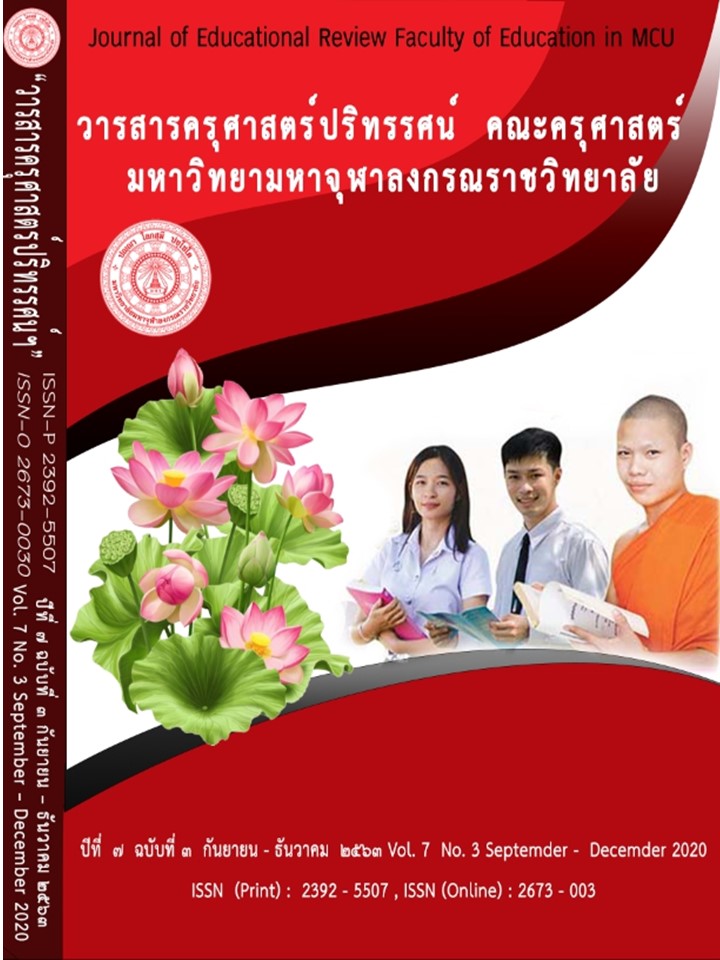AN APPLICATION OF THE FIVE PRECEPTS TO ENCOURAGE OF PEACEFUL COEXISTENCE OF ETHNIC GROUPS IN THE WESTERN
Main Article Content
Abstract
The purposes of this research article were 1) to study the application of the Pañca-sĩla or the Five Precepts in the daily life of ethnic groups in the Western, and 2) to analyze the model of the application of the Pañca-sĩla or the Five Precepts to encourage the peaceful coexistence of ethnic groups in the Western. This research was a qualitative research using In-depth interview with 8 key informants included government heads, community leaders and village scholars in western area of Thailand according to the characteristics of the appropriate group representation from a specific randomization method then analyzed the data obtained by means of content analysis and trying to keep the original and using a group discussion with 8 qualified persons including heads of government agencies, community leaders and religious scholars from the random sampling, the data obtained by analyzing descriptive content. The findings of this research were following: 1) The application of the Pañca-sĩla or the Five Precepts in the daily life of ethnic groups in the Western has 5 elements, there are life insurance, property insurance, family insurance, social insurance, health insurance. 2) The model of the application of the Pañca-sĩla or the Five Precepts to encourage the peaceful coexistence of ethnic groups in the Western found that there was continuous promotion of reconciliation through various public spiritual activities due to the fact that at present all sectors were working together and driving the Five Precepts Village Project according to the 20-year National Strategy by emphasizing on the participation process of 3 coordination or Pavara principle (Families-Temples-Government/Schools), family institute, Buddhist institute and administrative institutions and educational institutions were coordinated as network called “ Good conduct in Buddhist way network” which conducted social activities using the Five Precepts Village Project as a base.
Article Details
ทัศนะและความคิดเห็นที่ปรากฏในบทความในวารสารฉบับนี้ถือเป็นความรับผิดชอบของผู้เขียนบทความนั้นเพียงผู้เดียว และไม่ถือเป็นทัศนะและความรับผิดชอบของกองบรรณาธิการ
กองบรรณาธิการขอสงวนสิทธิ์ในการคัดเลือกบทความลงตีพิมพ์และจะแจ้งให้เจ้าของบทความทราบหลังจากผู้ประเมินบทความตรวจอ่านบทความแล้ว
ต้นฉบับที่ได้รับการตีพิมพ์ในวารสารครุศาสตร์ปริทรรศน์ คณะครุศาสตร์ มหาวิทยาลัยมหาจุฬาลงกรณราชวิทยาลัย ถือเป็นกรรมสิทธิ์ของคณะครุศาสตร์ มหาวิทยาลัยมหาจุฬาลงกรณราชวิทยาลัย ห้ามนำข้อความทั้งหมดหรือบางส่วนไปพิมพ์ซ้ำ เว้นเสียแต่ว่าจะได้รับอนุญาตจากมหาวิทยาลัยฯ เป็นลายลักษณ์อักษร
References
โคทม อารียา. (2548). สันติวิธีจากมุมมองศาสนา. นครปฐม: คณะสังคมศาสตร์และมนุษยศาสตร์ มหาวิทยาลัยมหิดล.
จิรโชค (บรรพต) วีรสัย และคณะ. (2540). รัฐศาสตร์ทั่วไป. กรุงเทพมหานคร: สำนักพิมพ์มหาวิทยาลัยรามคำแหง.
ธนพชร นุตสาระและคณะ. (2559). วิถีชีวิตการดำรงอยู่วัฒนธรรมกลุ่มชาติพันธุ์ อำเภอปาย จังหวัดแม่ฮ่องสอน. รายงานการวิจัย. มหาวิทยาลัยเชียงใหม่.
เบรนด์ อาร์ เนลสัน. (2548). ความคิดทางการเมืองตะวันตก. แปลโดย สมนึก ชูวิเชียร. กรุงเทพมหานคร: เอ็ม แอล ครีเอชั่น.
พระครูสุมณฑ์ธรรมธาดา (สายัน จนฺทวํโส). (2553). ศึกษาปัญหาและทางออกของการดื่มสุราที่มีผลกระทบต่อสังคมไทย. วิทยานิพนธ์พุทธศาสตรมหาบัณฑิต. มหาวิทยาลัยมหาจุฬาลงกรณราชวิทยาลัย.
พระเด่นชัย เมตฺติโก. (2556). แนวคิดเรื่องกายสุจริตในพระพุทธศาสนาเถรวาท. วิทยานิพนธ์พุทธศาสตรมหาบัณฑิต. มหาวิทยาลัยมหาจุฬาลงกรณราชวิทยาลัย.
พระพรหมคุณาภรณ์ (ป. อ. ปยุตฺโต). (2552). พุทธธรรม ฉบับปรับปรุงและขยายความ. พิมพ์ครั้งที่ 15. กรุงเทพมหานคร: สหธรรมิก.
พระพรหมคุณาภรณ์ (ป. อ. ปยุตฺโต). (2555). ความสำคัญของพระพุทธศาสนาในฐานะศาสนาประจำชาติ. กรุงเทพมหานคร: สหธรรมิก.
พระพุทธโฆสเถระ. (2546). คัมภีร์วิสุทธิมรรค. แปลโดย สมเด็จพระพุฒาจารย์ (อาจ อาสภมหาเถร). พิมพ์ครั้งที่ 4. กรุงเทพมหานคร: ประยูรวงศ์พริ้นท์ติ้ง.
พระมหาคำพอง สทฺทวโร. (2560). การจัดการศึกษาเพื่อสันติภาพของชาวพุทธและมุสลิมในชุมชนวัดท่าการ้อง จังหวัดพระนครศรีอยุธยา. วิทยานิพนธ์พุทธศาสตรมหาบัณฑิต. มหาวิทยาลัยมหาจุฬาลงกรณราชวิทยาลัย.
พระมหาสุทิตย์ อาภากโร. (2555). เอกสารประกอบการสอนวิชาพระพุทธศาสนากับการพัฒนาสังคม. พระนครศรีอยุธยา: คณะสังคมศาสตร์ มหาวิทยาลัยมหาจุฬาลงกรณราชวิทยาลัย.
พระอำนาจ ปริมุตฺโต. (2553). ศึกษาการรับรู้ข้อมูลข่าวสารที่มีผลต่อการรักษาเบญจศีลของพุทธศาสนิกชนในชุมชนวัดนารีราษฎร์ประดิษฐ์ กรุงเทพมหานคร. วิทยานิพนธ์พุทธศาสตรมหาบัณฑิต. มหาวิทยาลัยมหาจุฬาลงกรณราชวิทยาลัย.
วศิน โต๊ะสิงห์. (2559). คุณค่าและภูมิปัญญาประเพณีบุญกลางบ้านกลุ่มชาติพันธุ์ลาวเวียง อำเภอพนัสนิคม จังหวัดชลบุรี. วิทยานิพนธ์ศิลปศาสตรมหาบัณฑิต. มหาวิทยาลัยราชภัฏสุรินทร์.
ศรคม เผือกผิววงศ์. (2560). แนวทางการสร้างความร่วมมือในชุมชนด้วยพุทธสันติวิธี: กรณีศึกษาชุมชนวัดคู้บอน เขตคลองสามวา กรุงเทพมหานคร. วิทยานิพนธ์พุทธศาสตรมหาบัณฑิต. มหาวิทยาลัยมหาจุฬาลงกรณราชวิทยาลัย.
สมเด็จพระญาณวโรดม. (2550). แผนชีวิต. กรุงเทพมหานคร: โรงพิมพ์มหามกุฎราชวิทยาลัย.
สมมาส เส้งสุย. (2552). ยุทธศาสตร์การใช้เบญจศีลเพื่อพัฒนาคุณธรรมของนักเรียนโรงเรียนท่านครญาณวโรภาสอุทิศ ตำบลปากนคร อำเภอเมือง จังหวัดนครศรีธรรมราช. วิทยานิพนธ์ศิลปศาสตรมหาบัณฑิต. มหาวิทยาลัยราชภัฏสุราษฎร์ธานี.
อธิษฐาน พูลศิลป์ศักดิ์กุล. (2552). การรักษาศีลห้าของพุทธศาสนิกชนวัยแรงงาน: กรณีศึกษาเขตสวนหลวง กรุงเทพมหานคร. วิทยานิพนธ์รัฐศาสตรมหาบัณฑิต. มหาวิทยาลัยบูรพา.


